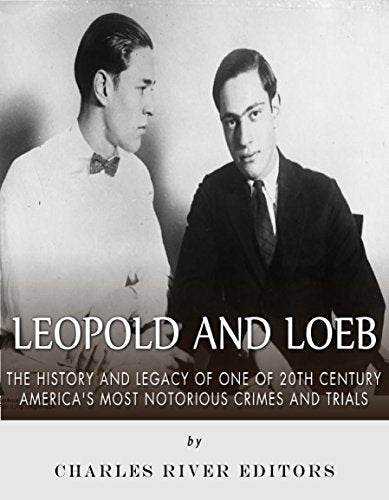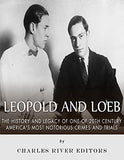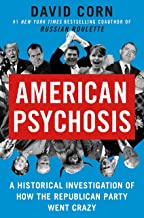Leopold and Loeb: The History and Legacy of One of 20th Century America's Most Notorious Crimes and Trials
ISBN: 9781514389522
*Includes pictures
*Includes accounts of the crime and trial, including the confessions
*Includes online resources and a bibliography for further reading
*Includes a table of contents
"A superman ... is, on account of certain superior qualities inherent in him, exempted from the ordinary laws which govern men. He is not liable for anything he may do." – Richard Loeb
There has been no shortage of shocking crimes and trials that generated frenzied coverage across America, but few can lay claim to “crime of the century” like the murder carried out by Nathan Leopold and Richard Loeb in 1924. While studying as young adults at the prestigious University of Chicago, Leopold and Loeb devised a meticulous plot to kidnap and murder a child while managing to get away with ransom money, thereby perpetrating what they considered a “perfect crime.”
On May 21, they put their plan in motion and targeted 14 year old Bobby Franks, who had the misfortune of being acquainted with Loeb. Franks was lured into a vehicle and brutally murdered before Leopold and Loeb dumped his body 25 miles away. When attempts at ransom went awry almost immediately, Leopold and Loeb tried to cover their tracks, only to have a special set of eyeglasses link Franks’ murder back to Leopold. Barely less than a week after the murder, the “perfect crime” completely unraveled when Leopold and Loeb were brought in for formal questioning and confessed.
The crime was horrific enough, but the trial brought even more attention to the case, and it touched on several crucial issues. Both young men cited the philosophy of Friedrich Nietzsche as a motivation for attempting to commit the crime and prove they were better than the common man. As Leopold told his own attorney, "The killing was an expe
*Includes accounts of the crime and trial, including the confessions
*Includes online resources and a bibliography for further reading
*Includes a table of contents
"A superman ... is, on account of certain superior qualities inherent in him, exempted from the ordinary laws which govern men. He is not liable for anything he may do." – Richard Loeb
There has been no shortage of shocking crimes and trials that generated frenzied coverage across America, but few can lay claim to “crime of the century” like the murder carried out by Nathan Leopold and Richard Loeb in 1924. While studying as young adults at the prestigious University of Chicago, Leopold and Loeb devised a meticulous plot to kidnap and murder a child while managing to get away with ransom money, thereby perpetrating what they considered a “perfect crime.”
On May 21, they put their plan in motion and targeted 14 year old Bobby Franks, who had the misfortune of being acquainted with Loeb. Franks was lured into a vehicle and brutally murdered before Leopold and Loeb dumped his body 25 miles away. When attempts at ransom went awry almost immediately, Leopold and Loeb tried to cover their tracks, only to have a special set of eyeglasses link Franks’ murder back to Leopold. Barely less than a week after the murder, the “perfect crime” completely unraveled when Leopold and Loeb were brought in for formal questioning and confessed.
The crime was horrific enough, but the trial brought even more attention to the case, and it touched on several crucial issues. Both young men cited the philosophy of Friedrich Nietzsche as a motivation for attempting to commit the crime and prove they were better than the common man. As Leopold told his own attorney, "The killing was an expe













